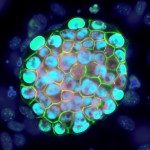Lien vers Pubmed [PMID] – 21524403
Med Sci (Paris) 2011 Apr;27(4):387-90
Rat and mice are privileged tools for scientists. However, despite obvious advantages, such as a larger size, more faithful reproduction of human diseases, and utility for physiological and cognitive studies, rats have suffered from limited genetic technologies such as targeted mutagenesis. However, the gap between rat and mouse for genetic approaches will soon disappear with the recent advances of zinc finger nucleases applicable to early-stage rat embryos and the successful derivation of germ line competent rat ES cells, almost thirty years after murine ES cells. This will lead to new opportunities and to increase our capacity to model human pathologies.
